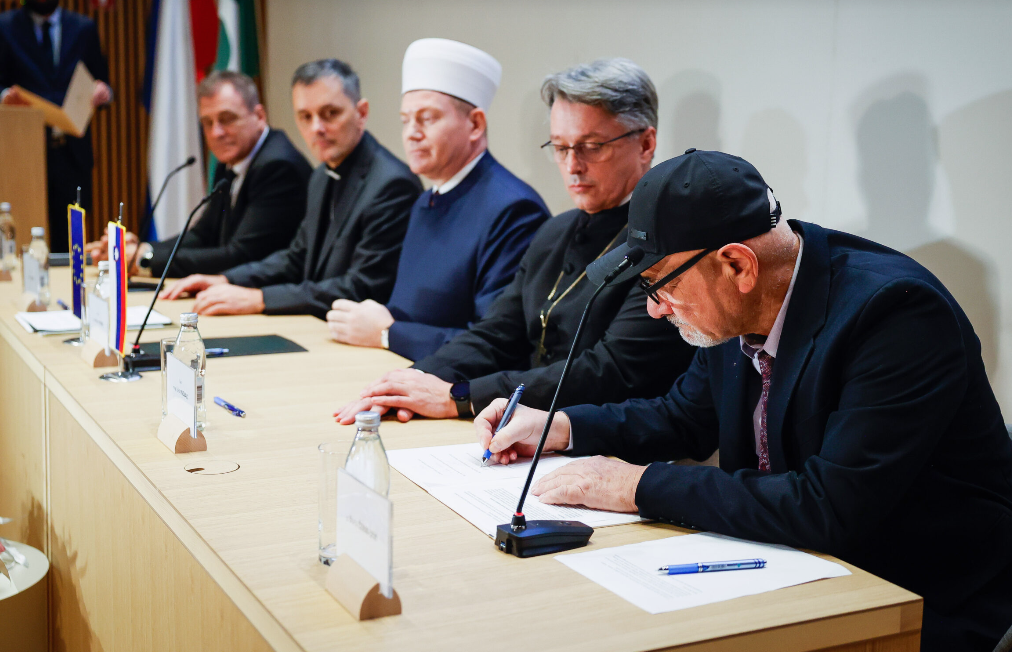“Despite medical advances, the fact remains that we are subject to ageing, diseases and suffering, and inevitably death. It is important to remember that this is all part of the totality of human life,” the representatives of religious communities said in a joint statement, which they described as a historic event.
Representatives of religious communities signed a joint statement in Ljubljana on Tuesday, opposing the introduction of assisted suicide into Slovenian law. Every terminally ill individual should receive the best and most comprehensive physical, emotional, social, religious, and spiritual palliative care possible, their joint statement reads.
It was signed by representatives of the Islamic Community in Slovenia, the Catholic Church, the Evangelical Church of the Augsburg Confession, the Pentecostal Church, and the Jewish Community, as well as by representatives of the Macedonian and Serbian Orthodox Churches. They believe that the draft law on voluntary end of life should be withdrawn from the parliamentary process immediately.
Euthanasia means abandoning care for the most vulnerable
The representatives of the aforementioned religious communities believe that everything in our power should be done to help any suffering person. Every society shows its humanity by helping the vulnerable, the sick, the elderly and the suffering in every way it can, so that every member of society can one day live out his or her life in peace, despite illness and ageing, they believe.
“Any act that deliberately ends our own life or the life of another is the complete opposite of what we should strive for as a society, which is respect and care for every human life. Both ethically and religiously, such an act is reprehensible, and introducing the option of assisted suicide is a societal abdication of care for the most vulnerable,” they added in their statement.
A historic event
Andrej Saje, the President of the Slovenian Bishops’ Conference, described the common position of the religious communities on the protection of human life as a historic event. He stressed that human life is priceless and that the attempt to introduce assisted suicide is a change in culture and in the view of human dignity.
“We call on all decision-makers to protect human life, to enable people to die with dignity, and above all for society as a whole, and also for us as religious communities, to look into this question of how to enable a more dignified death in terms of palliative care,” Saje said at the press conference.
The palliative care for any dying person and their family is also supported by Bishop Leon Novak of the Evangelical Church of the Augsburg Confession in Slovenia. “Instead of quick fixes in the form of suggesting suicide, we promote a noble human commitment to care for one another, and especially for those who are suffering,” he stressed.
Suffering patients also need hope at the end of life, added Daniel Grabar, Superintendent of the Church of Pentecost. “It is no longer a long-term hope, it is perhaps the bright moments that I will spend a few pain-free minutes talking with my loved ones. We take it away from them when they start to think about ending their lives voluntarily,” he believes.
“As this joint statement of ours says, introducing the option of suicide by law would indirectly encourage patients to end their own lives, which is unacceptable to us, both from a religious and an ethical point of view,” stressed Boris Čerin-Levi, President of the Jewish Community of Slovenia.
The Mufti of the Islamic Community in Slovenia, Nevzet Porić, stressed that the state and state institutions sometimes have to protect their citizens from themselves, which is why the representatives of religious communities do not agree with the proposal for a law on the voluntary ending of life or ending of life with the help of another person. “A medical intervention aimed at deliberately ending a life is unethical, even when that is the patient’s wish,” he said.
Porić also drew attention to the Freedom of Religion Act, which he said was being changed without dialogue with religious communities. The law is very flawed and needs changes to make it easier for religious communities to operate, he stressed. Saje, who believes that the dialogue between the state and religious communities has regressed, agreed with Porić.
C. Š.


